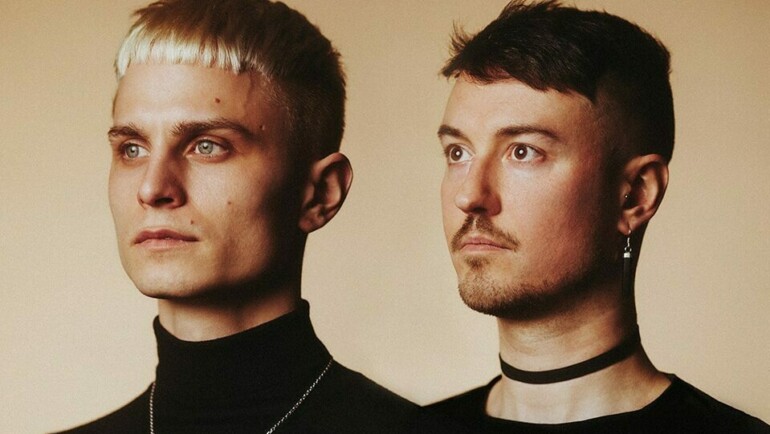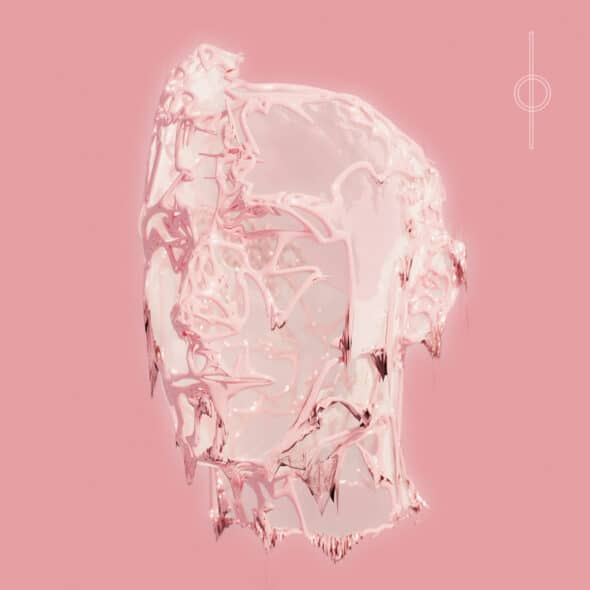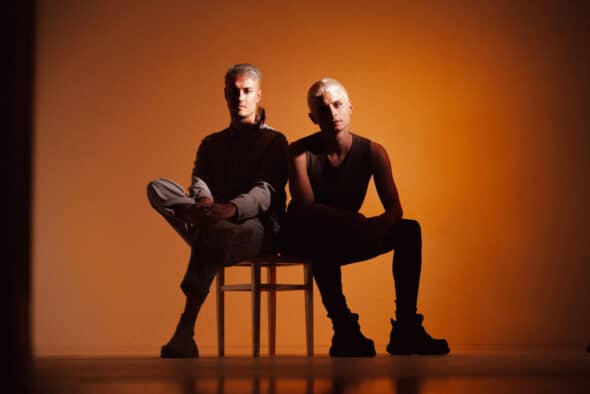
LAIKKA, the duo that attracted attention with “The Answer” at the beginning of 2021, consists of MORITZ WUNDERWALD and ALEX GRUEHN. They named themselves after Laika, the first female dog in space – quite a programmatic band name. In October, the band released their debut album “Morning Glow” (Fabrique Records). In an interview with Itta Francesca Ivellio-Vellin, Moritz and Alex talk about their beginnings, escapism into art and hopelessness in media.
Moritz, you are originally from Augsburg, aren’t you? How long have you been living in Vienna?
Moritz Wunderwald: I’ve been in Vienna for seven years and I’m very happy here.
Why did you choose Vienna back then?
Moritz Wunderwald: Until last summer, I studied here. Now I have been concentrating on music for a year and recently started Digital Art at the Angewandte.
“…we met and just realized that our ideas of music and aesthetics fit together.”
You’re on a similar path, aren’t you, Alex?
Alex Gruehn: Yeah exactly, I do a mix of programming and art [laughs].
Is that where your internet aesthetic comes from?
Alex Gruehn: Yes, that’s exactly what we’re passionate about and how it developed.
How did you get to know each other?
Moritz Wunderwald: Rather coincidentally. It was about two years ago when we met for the first time. I had written a few new songs that didn’t quite fit into what I had done before. And we met and just realized that our ideas of music and aesthetics fit together.

Alex Gruehn: Then we met again in the same week and recorded the song that was released first.
How do you come up with your music videos? Do you think about the concepts yourselves or do you outsource that part?
Alex Gruehn: We always come up with the concepts ourselves. And then we also like to work with different people, for example with the artist Rage, who produced the video for “The Glow” with us.
Moritz Wunderwald: Yes, Rage is actually a painter. In the video, she created one of her paintings, a desert landscape, as a 3D image in which you can move around.
Alex Gruehn: The song is called “The Glow” and the lyrics are a lot about a blinding light that you want to hide from.
Moritz Wunderwald: The image of the “Glow” as a blinding light is a metaphor for the pressure that you put on yourself and also get from society. I associate the song with the feeling that it’s also okay to stay out of it and hide. It’s okay to look after yourself and thereby find new strength.
How do you manage to deal with social pressure? In how far can you detach yourselves from it, hide from it?
Alex Gruehn: That is also a central theme for us. It’s what a lot of the album is about. There are differences, of course – it depends on where you live. If you live here in Vienna, for example – there’s enough space that you can express yourself as you want – you are not so constricted here.
Moritz Wunderwald: I think as an artist you often have a relatively easy way to create escapism by taking time for art and losing yourself in it a bit. That’s how it is for me – it’s a good way to relieve pressure. I can also create my own reality a bit.
“…as an artist you often have a relatively easy way to create escapism…”
But you can let off steam on the stage – as far as the pandemic allows. Among other shows, you also performed at Waves.
Moritz Wunderwald: Yes, we had the last slot of the first day at WUK foyer, which was great. We finally had the chance to realize many of the visions we had for our live performances. For example, to work with a big projection. As an intro at live performances, we use a piece of art we designed for a gallery in early summer, and we were finally able to show that on a huge screen at Waves Vienna.
Alex Gruehn: Exactly, we could finally try out the whole light set-up there. We released the first song in February 2020, so LAIKKA started when everything started to lock down. We hardly had the chance to perform live in the beginning.

Moritz Wunderwald: During the Corona period, we tried to make the best of it in terms of playing live. We organized a show ourselves, performed at the Gürtel Nightwalk in Vienna and at an art festival in the Vienna countryside. But yes, the possibilities were and are very limited. A first planned tour had to be postponed and so we hope for 2022 and are cautiously optimistic.
You work is quite inter-/transdisciplinary – it’s not just about music for you.
Moritz Wunderwald: Yes, LAIKKA is a total work of art that consists of music, visuals, graphics, fashion and videos. We want to harmonize everything and also make as much as possible ourselves, so that there is as much of us as possible in every part that the public sees.
What role does fashion play for you?
Moritz Wunderwald: I really like to play with outfits that are more feminine coded. I don’t see it that way, because fashion is genderless and it should only be about personal expression and not about living up to any norms. It’s also an important theme in our lyrics that we break classic masculine stereotypes – and that works very well through fashion because many people react so strongly to it.
Escaping norms and breaking stereotypes is, as you said, essential in your music. How is that represented on the new album?
Alex Gruehn: The album title is “Morning Glow” – this expression has several meanings for us. But overall, it represents our time together so far, the time since we started making music together. It has been a time of new beginnings. Since then, a lot happened, for example in terms of self-discovery. Especially the personal and artistic examination of masculinity is something that has affected me all my life – maybe never as consciously as it does now.
Moritz Wunderwald: We have also always given each other a lot of strength and confirmation in our development, since we’ve met. “Morning Glow” means on the one hand the beginning of a new day, a new start, and, on the other hand, the end of darkness. The end of having to follow specific patterns, consciously or unconsciously. Breaking out of acquired habits.
The light at the end of the tunnel?
Moritz Wunderwald: Exactly. We don’t focus on the major problems of global politics, but we do focus on socially relevant issues in our music. Among other things, we address psychological problems or depression. It’s also about facing and admitting your own feelings in general.
“We don’t focus on the major problems of global politics, but we do focus on socially relevant issues in our music.”
Which brings us back to breaking out of male stereotypes.
Moritz Wunderwald: [laughs] Yes, exactly. We all know by now that men have feelings too, but it’s still not that widespread – it’s still not really okay to show them.
The pandemic, or rather the consequences of the measures such as isolation and lockdown, have caused a massive rise of mental health problems. As a result, the topic is slowly becoming less of a taboo, because more and more people are feeling this way, and people are slowly but surely talking about it.
Alex Gruehn: Absolutely. It’s also this insecurity that people are exposed to in times like these. Loneliness and fear of the future also play into it.
Moritz Wunderwald: Our song “Dissolving” deals exactly with this topic: self-doubt and fear of the future, which were and still are very present during this time.
A song that I personally like very much is “The Answer”.
Moritz Wunderwald: I have an ambivalent relationship to “The Answer”. On the one hand, the song is very positive, and I also associate a good feeling with it. The song also plays with a tension of this attraction that can’t be properly reciprocated. You hold on to someone, but at the same time you know that there’s no hope there. But, as the chorus says, “you give me the answer,” so somehow the person does you a lot of good.
Alex Gruehn: Exactly, it’s a very ambivalent interpersonal relationship that the song is about.
You hit a certain zeitgeist with your emotional lyrics, which are about loneliness, depression and, like you just mentioned, ambivalent interpersonal relationships, as well as the synth-dream-pop music.
Moritz Wunderwald: Yes, of course. Because we have all gone through the same thing in the last few months, many people feel the same way, which means that many people can relate to this kind of music.
Alex Gruehn: Absolutely. Basically, you only have to look at the media coverage: There is virtually a constant hopelessness transported. In my opinion, this has been going on since the 90s. The EDM era was a bit of a “YOLO and Fuck It” response to that, and now it’s going the other way again [laughs].
Thanks for the interview!
Itta Francesca Ivellio-Vellin
LAIKKA Links:
Translated from the German original by Itta Francesca Ivellio-Vellin.
